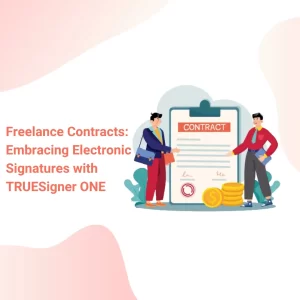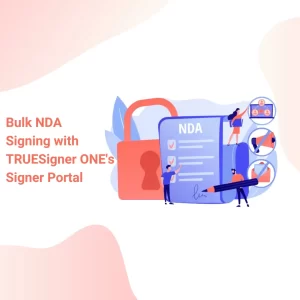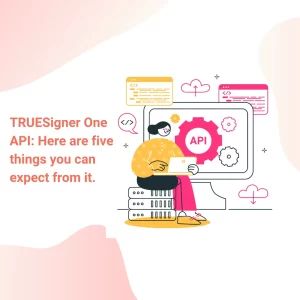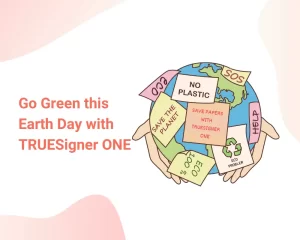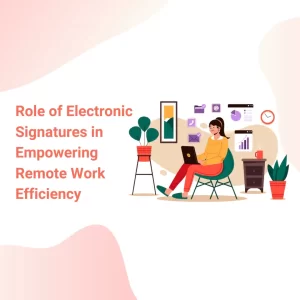Electronic signatures are at the forefront of a digital revolution in the healthcare industry, which is well-known for its commitment to innovation and patient welfare. The complex function that electronic signatures play in healthcare operations is examined in detail in this blog. It carefully tackles issues, debunks common misconceptions, and highlights the game-changing benefits that eSign solutions provide the sector. The blog explores how electronic signatures are changing the world of healthcare documents, from assuring legal validity to highlighting the unique features of TRUESigner ONE. Electronic signatures stand out as essential tools as healthcare enters the digital era. They link operations with efficiency and compliance, improving patient care delivery in the process.

Often used scenarios:
- Forms for patient intake and consent
- Outcomes of patient tests
- Hospital and pharmacy expenses for prescribed medications
- Certifications and medical reports
- Purchase order for medical equipment
- Purchasing goods for medicine
Health records can be appropriately secured with the use of digital signature systems.
Role of Electronic Signatures in Healthcare Operations
Here we will understand how electronic signatures simplify important healthcare procedures while increasing productivity, cutting down on paperwork, and guaranteeing documentation correctness.
- Simplifying Crucial Procedures: Electronic signatures in the healthcare industry are essential for streamlining and improving many operational processes.
- Improving Efficiency: Healthcare workflows are made more efficient by digitising signature procedures, which also shortens the time needed for document approval and completion.
- Reducing Paperwork: By eliminating the need for traditional paper documents and simplifying administrative procedures, the use of electronic signature software dramatically contributes to a paperless environment.
- Providing Accuracy in Documentation: Electronic signature solutions provide accuracy in medical records by lowering the possibility of mistakes resulting from manual procedures and encouraging data accuracy.
- Enhancing Compliance: By complying with regulatory standards, electronic signatures guarantee that healthcare operations meet legal obligations and compliance guidelines.
- Encouraging Safe Information Management: Electronic signatures protect private patient data and preserve data integrity and confidentiality thanks to sophisticated security features.
- Encouraging Patient-Centric Care: Electronic signatures for healthcare expedite procedures, lower errors, and improve security, all of which support a patient-centric approach and, in the end, raise the standard of care given.
Challenges with Wet Signatures in Healthcare
Examining the shortcomings of conventional wet signatures in the healthcare industry highlights intrinsic constraints that demand a transition to more flexible and safe substitutes. Wet signatures are manual, which adds time to the process and makes it more difficult to handle important papers quickly in healthcare operations. Furthermore, touching paper documents physically raises security issues that could lead to data breaches and jeopardize patient privacy. This analysis highlights the necessity for a more contemporary strategy and emphasizes the need for quick and safe solutions—like electronic signatures—to address the issues related to wet signing procedures that are out of date in healthcare settings.
Ways of Utilizing eSignature Solutions in Healthcare

- Simplifying Patient Consent: Signing up for patient consent forms should happen more quickly.
- Effective Medical Records Administration: Optimize the administration of vital medical documents.
- Diverse Daily Operations: The use of this technology positively affects many aspects of healthcare operations.
- Beyond Administrative Tasks: The usage demonstrates how flexible eSignature technologies are in helping to transform healthcare beyond standard administrative duties.
- Workflow automation: Many hands may be involved in the traditional paper-based signature process for a single document. For example, the patient may sign the intake form in person and provide it to the physician. After that, the admin team receives it to scan and save.
Legal validity and authenticity of electronic signatures
This section addresses concerns about the legitimacy of electronic signatures in the healthcare industry. After thoroughly examining the strong framework confirming the validity and authenticity of eSignatures in the healthcare sector by digging into pertinent laws and acts. We reaffirm that Electronic signatures ensure compliance with HIPAA, FDA’s 21 CFR Part 11, eIDAS, GDPR, and regional laws, maintaining legal standards in the United States and the European Union. Our examination upholds trust in the legitimacy of electronic signatures by highlighting their adherence to accepted standards and their crucial function in guaranteeing the legality of medical records.
Securing Electronic Signatures in Healthcare
This section explores the stringent security procedures that digital eSignature solutions implement, emphasizing the crucial necessity of security in healthcare. The investigation highlights how crucial it is to protect private patient information and maintain data integrity. The story highlights the reliability of electronic signatures in the healthcare industry by highlighting these strong security measures, guaranteeing the privacy of sensitive information and upholding the strictest information security guidelines.
Benefits of eSign Solutions in Healthcare
- Cost Savings: Operating expenses are decreased by streamlined procedures.
- Time Efficiency: Document workflows that move more quickly improve operational speed.
- Observance and safety: Your digital signature provider must adhere to strict security guidelines and standards if you work in the healthcare sector for your signature to be accepted by law. These legal considerations could affect how patient data is communicated, how signatures are obtained, or how papers are kept, either directly or indirectly.
- Better Patient Care: More focused and better patient care are the results of increased efficiency.
- Streamlined Procedures: By cutting down on delays and possible mistakes, electronic signatures help ensure that paperwork moves smoothly.
TRUESigner ONE in Healthcare
This in-depth analysis reveals TRUESigner ONE’s usefulness in the healthcare sector. It draws attention to the platform’s customized features and functionalities, which have been painstakingly created to meet the unique needs of the healthcare industry. Through its adherence to industry standards, TRUESigner ONE becomes a vital instrument that enhances overall operational efficiency in the healthcare sector. This investigation clarifies how TRUESigner ONE combines with healthcare workflows to provide a safe and effective solution that meets the particular needs of the industry.
Summing up
To sum up, this blog has revealed how electronic signature software is revolutionizing the healthcare sector. eSign solutions have become essential instruments that may revolutionize everyday processes and ensure legal validity and security. With its customized features, TRUESigner ONE distinguishes itself as a major participant in the healthcare digitalization process by providing a safe, effective, and compliant solution. Electronic signatures are keystones of innovation in the healthcare industry, propelling good change for patients and providers alike as it continues to embrace the digital age.

